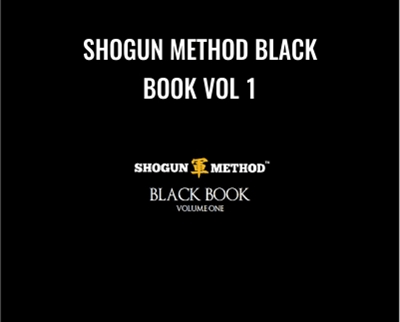Strategic Thinking Skills – TTC
Original price was: $254.95.$37.00Current price is: $37.00.
Strategic Thinking Skills – TTC Download. It involves setting goals, developing long-range plans, anticipating the unexpected, analyzing your environment, …
Salepage link: At HERE. Archive:
Strategic thinking is a powerful and invaluable skill, one that leads to greater chances of success in whatever professional and personal projects you’re involved in. It involves setting goals, developing long-range plans, anticipating the unexpected, analyzing your environment, and even cooperating with your competitors.
The only catch: Strategic thinking doesn’t come naturally. Because most of us are static thinkers who tend to make decisions only for today, strategic thinking skills have to be learned, cultivated, practiced, and applied.
Mastering the art and craft of strategic thinking can help you
- plan more effectively with an eye for avoiding unpleasant surprises;
- impose a stronger sense of order on chaotic, disorderly projects and scenarios;
- make savvier decisions and outsmart your competitors with greater confidence and ease; and
- increase your productivity and satisfaction at work and at home.
And while the subject owes much to ideas and techniques developed in military situations, its applications go far beyond. With Strategic Thinking Skills, you’ll get a simple and comprehensive guide to the skills, tactics, techniques, tools, case studies, and lessons behind this all-important process. Business consultant, former military intelligence officer, and award-winning Professor Stanley K. Ridgley of Drexel University has crafted these 24 lectures as an accessible way to engage with thinking that will help you think—and act—more strategically in business and in your own life, whether you’re the CEO of a Fortune 500 company or you’re preparing to embark on a new career path.
Explore the Strategic Thinker’s Tool Box
Strategic thinking is a way of looking at the world with engagement and purpose in mind, and with a more solid understanding of the complex systems and environments of which you’re a part. But what makes for successful strategic thinking?
“Successful strategy,”Professor Ridgley notes at the start of these lectures, “is dynamic, adaptive, and opportunistic. It depends upon the swift, bold, and crisp execution of tactics.”
Strategic Thinking Skills is a veritable tool box for those interested in learning (or strengthening) their approach to strategy. These lectures are loosely organized around several key topics central to effective strategic thinking. Here are just three:
- Principles of conflict:Throughout history, soldiers and scholars ranging from Sun Tzu to Napoleon have attempted to develop principles of conflict that tend to overlap in some surprising ways. You’ll follow the development of strategic theory from its roots in great military campaigns to its modern applications in business, meeting some of the great minds who helped shape our understanding of strategic thinking.
- Finding (and using) intelligence:You can’t learn about strategic thinking without learning about competitive intelligence, which plays an increasingly important role in strategic thinking. Not only do effective strategic thinkers want to find out what the other side is doing, they want to mislead the other side about what they’re doing. As you’ll discover, intelligence and analysis provide a firm foundation on which you can build a sound strategic structure.
- Tools of strategy and analysis: Strategic thinking equips you with a range of tools that can help you plan for and meet the future with greater confidence. Knowing how to wield tools—such as the five basic types of surprises— can aid your understanding of the forces that shape our future and can help you make sense of a rapidly changing world.
Learn How to Use Strategic Tools and Tricks
Central to Strategic Thinking Skills is Professor Ridgley’s revealing look at the various tools and tricks that strategic thinkers have used throughout history to better approach problems and seek lasting solutions. Among those you’ll learn how to use are
- the indirect approach, a technique with its origins in military science that thwarts your opponent’s expectations and offers you a much greater utility in achieving your objectives without approaching your opponent head-on;
- the value chain, a method of strategic analysis that divides your team or organization into its value-producing activities so you can evaluate it and better inform yourself on its internal strengths and weaknesses;
- the four actions framework, a strategy that consists of asking yourself four key questions to challenge your established logic and business structure in an effort to develop and implement a new value curve that will give you a stronger competitive advantage; and
- the five basic behaviors of luck, a set of behaviors—including the hunching skill, the ratchet effect, and the pessimism paradox—that can greatly enhance the odds that you will fulfill your strategic plan.
Gain Invaluable Lessons from Historical Case Studies
Strategic Thinking Skills is filled with case studies from the realms of business, politics, military science, and even sports. Each case study that Professor Ridgley unpacks offers you invaluable lessons on approaching and practicing your own strategic thinking.
- The Battle of the Bulge and the dangers of overreaching:One danger to strategic planning is overreach, in which an individual or group lacks the capabilities needed to carry out ambitious goals. Lasting more than a month, World War II’s Battle of the Bulge was the result of bold German plans to blast through American and British forces in the Ardennes forest to gain strategic military and political objectives—despite lacking the manpower to accomplish this bold scenario. The result, as history shows, was a reverberating defeat that hastened the end of the war in Europe.
- Polaroid, Kodak, and the importance of quick response:How fast a business responds to industry changes can be critical to business success—especially as the pace of change in many industries increases more than ever. Kodak and Polaroid were two iconic camera and film companies that dominated the industry until the 1980s but failed to recognize how fast the digital revolution and the subsequent change in the market were occurring. The tempo of the surprise caught them off guard, eventually sending both companies into bankruptcy.
- The cold war and the power of cooperation:When the dangers and costs of miscommunication between two rivals become greater than any benefit derived from no cooperation, that lays the groundwork for mutually recognized and orchestrated cooperation that can benefit both sides. A familiar example of this is the “hot line”between Washington, DC, and Moscow that allowed the U.S. and Soviet governments to cooperate on some of the most dangerous issues threatening both nations—including all-out thermonuclear war.
Along the way, you’ll get an intimate look at how some of history’s greatest strategic thinkers, including Steve Jobs, John F. Kennedy, Napoleon Bonaparte, Vince Lombardi, and Abraham Lincoln, approached situations, applied their knowledge and skills to setting long-term goals, and even dodged (and sometimes failed to dodge) common pitfalls in strategic thinking and planning.
Develop Your Strategic Personality
As an expert in global business policies, competitive intelligence, and advanced strategic business strategies, Professor Ridgley is the perfect instructor to guide you through this intriguing and undeniably fascinating subject. His skills at breaking down the complex parts of strategic theories, at revealing the individual steps of some of history’s greatest strategic victories (and blunders), and at inspiring people to apply the principles and tools of strategic thinking to all aspects of their everyday lives are sure to impress you.
“It is our attitude toward events that determines how we deal with them,”he notes. “Developing a strategic personality is one way to cultivate an attitude capable of meeting those events. What you want to be five or ten years from now informs what you do today. It tells you how to move your pieces on the great chessboard of your life.”
So transform the way you think about and approach the projects and challenges of the future—whether in your professional or your personal life—with Strategic Thinking Skills.
What Does Each Format Include?
INSTANT VIDEO INCLUDES:
- Download 24 video lectures to your computer or mobile app
- Downloadable PDF of the course guidebook
- FREE video streaming of the course from our website and mobile apps
DVD INCLUDES:
- 24 lectures on 4 DVDs
- 232-page printed course guidebook
- Downloadable PDF of the course guidebook
- FREE video streaming of the course from our website and mobile apps
What Does The Course Guidebook Include?
COURSE GUIDEBOOK DETAILS:
- 232-page printed course guidebook
- Photos & illustrations
- Suggested readings
- Questions to consider
Here's an overview of the prominent keywords and a list of famous authors:
Business and Sales: Explore business strategies, sales skills, entrepreneurship, and brand-building from authors like Joe Wicks, Jillian Michaels, and Tony Horton.
Sports and Fitness: Enhance athleticism, improve health and fitness with guidance from experts like Shaun T, Kayla Itsines, and Yoga with Adriene.
Personal Development: Develop communication skills, time management, creative thinking, and enhance self-awareness from authors like Gretchen Rubin, Simon Sinek, and Marie Kondo.
Technology and Coding: Learn about artificial intelligence, data analytics, programming, and blockchain technology from thought leaders like Neil deGrasse Tyson, Amy Cuddy, and Malcolm Gladwell.
Lifestyle and Wellness: Discover courses on holistic health, yoga, and healthy living from authors like Elizabeth Gilbert, Bill Nye, and Tracy Anderson.
Art and Creativity: Explore the world of art, creativity, and painting with guidance from renowned artists like Bob Ross and others.
All the courses on WSOlib are led by top authors and experts in their respective fields. Rest assured that the knowledge and skills you acquire are reliable and highly applicable.
User Reviews
Only logged in customers who have purchased this product may leave a review.

Original price was: $254.95.$37.00Current price is: $37.00.












There are no reviews yet.